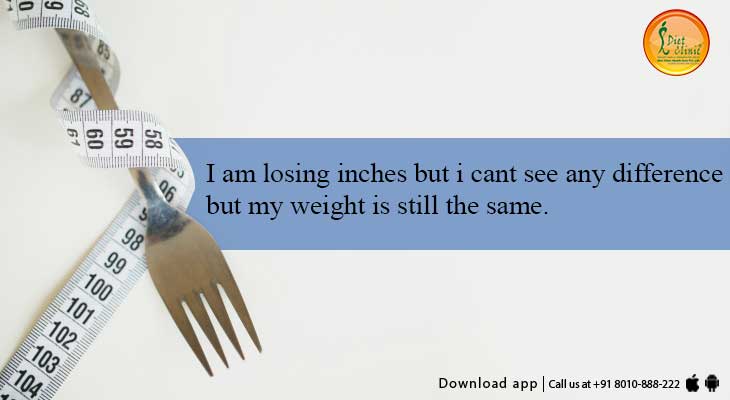
Dietician Sheela Seharawat
I am losing inches but I can't see any difference in my weight. I feel light too, but my weight is still the same.
I am demotivated and disheartening :
(Is this is your problem too? Are you also facing the same situation? Then have a look, you might fell motivated and start continuing with your efforts ;)
Weight loss is not only losing some kilos on the weighing scale, but it is also much beyond that.
Step on the scale first thing in the morning and if that number is lower than it was before, you may feel better about yourself. If it's higher? Your day may start on a downward slide.
But, what does your weight really mean and how useful is it when it comes to tracking weight loss progress? Learning the answers to those questions may give you a completely different perspective of your scale.
Focusing On Fat Loss Not Weight Loss:
When we talk about losing weight, what we usually mean is slimming down. We want to lose weight around the hips and thighs, the belly and arms.
But, the odd thing about slimming down is that it doesn't always mean losing actual weight off the scale.
It may sound strange, but it's possible to get thinner without actually seeing a change in your weight. This happens when you lose body fat while gaining muscle. Your weight may stay the same, even as you lose inches, a sign that you're moving in the right direction.
The problem is, we're often focused on the scale, believing that if that number doesn't change, we're simply not getting real results. Knowing the difference between losing weight and losing body fat can change how you see your self, your progress, and maybe even how you look at your own body.
The Truth About Your Weight:
Our body comprises of various things such as bones, water weight, muscles, organs, water retention, the food we just ate, clothing. These things together tells you the weight.
How The Scale Lies:
1) It measures everything:
The number on the scale includes everything - Muscles, fat, bones, organs, fat, food, and water. For that reason, your scale weight can be a deceptive number.
2) It doesn't reflect the changes happening in your body:
If you're doing cardio and strength training, you may build lean muscle tissue at the same time you're losing fat. In that case, the scale may not change even though you're getting leaner and slimmer.
3) It doesn't reflect your health:
As mentioned above, the scale can't tell the difference between fat and muscle. That means a person can have low body weight, but still have unhealthy levels of body fat.
4) It isn't always a positive motivator:
If you step on the scale and you're unhappy with what you see, how does that make you feel? You may question everything you're doing, wondering why you even bother at all. Focusing on weight may overshadow the positive results you're getting such as fat loss, more endurance, and higher energy levels.
Changing How You Measure Your Success:
Even if you're not ready to stop weighing yourself entirely, using other ways to measure progress can keep you motivated and help you realize that you are making changes, no matter what the scale says. This is especially true if you're not losing weight where you'd like to.
1) Go by how your clothes fit: If they fit more loosely, you know you're on the right track. It helps to have one pair of pants that are a little too tight. Try them on once a month and make notes on how they fit. Clothes don't lie.
2) Take your measurements to see if you're losing inches: Measuring your body at different points helps you figure out if you are, in fact, losing fat. Knowing that may motivate you to keep going and allow your body to respond to your workouts.
If the scale is making you crazy, taking a break from weighing yourself may just open your eyes to other possibilities. Your weight isn't the only measure of your success. Put away the scale and you may just see how far you've really come.










